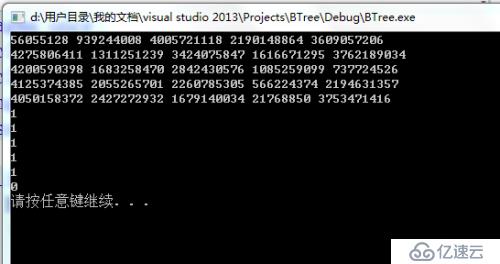布隆过滤器(Bloom Filter)是由布隆(Burton Howard Bloom)在1970年提出的。它实际上是由一个很长的二进制向量和一系列随机映射函数组成,布隆过滤器可以用于检索一个元素是否在一个集合中。它的优点是空间效率和查询时间都远远超过一般的算法,缺点是有一定的误识别率(假正例False positives,即Bloom Filter报告某一元素存在于某集合中,但是实际上该元素并不在集合中)和删除困难,但是没有识别错误的情形(即假反例False negatives,如果某个元素确实没有在该集合中,那么Bloom Filter 是不会报告该元素存在于集合中的,所以不会漏报)。
即布隆:存在,不准确(哈希冲突) 不存在:准确
改进:映射位越多,占空间越多,误判率越低。
可使用计数达到删除功能
布隆底层:使用位图。
如果想判断一个元素是不是在一个集合里,一般想到的是将集合中所有元素保存起来,然后通过比较确定。链表、树、散列表(又叫哈希表,Hash table)等等数据结构都是这种思路。但是随着集合中元素的增加,我们需要的存储空间越来越大。同时检索速度也越来越慢。
Bloom Filter 是一种空间效率很高的随机数据结构,Bloom filter 可以看做是对 bit-map 的扩展, 它的原理是:
当一个元素被加入集合时,通过 K 个 Hash 函数将这个元素映射成一个位阵列(Bit array)中的 K 个点,把它们置为 1。检索时,我们只要看看这些点是不是都是 1 就(大约)知道集合中有没有它了:
如果这些点有任何一个 0,则被检索元素一定不在;
如果都是 1,则被检索元素很可能在
它的优点是空间效率和查询时间都远远超过一般的算法,布隆过滤器存储空间和插入 / 查询时间都是常数O(k)。另外, 散列函数相互之间没有关系,方便由硬件并行实现。布隆过滤器不需要存储元素本身,在某些对保密要求非常严格的场合有优势。
但是布隆过滤器的缺点和优点一样明显。误算率是其中之一。随着存入的元素数量增加,误算率随之增加。但是如果元素数量太少,则使用散列表足矣。
(误判补救方法是:再建立一个小的白名单,存储那些可能被误判的信息。)
另外,一般情况下不能从布隆过滤器中删除元素. 我们很容易想到把位数组变成整数数组,每插入一个元素相应的计数器加 1, 这样删除元素时将计数器减掉就可以了。然而要保证安全地删除元素并非如此简单。首先我们必须保证删除的元素的确在布隆过滤器里面. 这一点单凭这个过滤器是无法保证的。另外计数器回绕也会造成问题。
模拟实现如下:
#pragma once
#include<iostream>
#include<vector>
using namespace std;
class BitMap//将数据存储在对应的位,用位来存储数据
{
public:
BitMap(size_t len)
{
int size = len >> 5;
if (len % 32)
_array.resize(size + 1);
else
_array.resize(size);
}
BitMap(size_t minLen, size_t maxLen)//如果用这种,求下标时(num-minLen)/32
{
int size = (maxLen - minLen + 1) >> 5;
if ((maxLen - minLen + 1) % 32)
_array.resize(size + 1);
else
_array.resize(size);
}
void Set(size_t num)
{
size_t index = num >> 5;
size_t count = num % 32;
_array[index] |= (1 << count);//将_array[index]第count位置为1,此处存储和大小端有关系
}
void ReSet(size_t num)
{
size_t index = num >> 5;
size_t count = num % 32;
_array[index] &= (!(1 << count));//将_array[index]第count位置为1,此处存储和大小端有关系
}
bool Test(size_t num)
{
size_t index = num >> 5;
size_t count = num % 32;
return _array[index] & (1 << count);
}
private:
vector<int> _array;//用vector<char>不能存储相同的数,有限制,因为它只有0,1两个不同的位
};
class HashFunc1
{
size_t BKDRHash(const char* str)
{
register size_t hash = 0;
while (size_t ch = (size_t)*str++)
{
hash = hash * 131 + ch;
}
return hash;
}
public:
size_t operator()(string key)
{
return BKDRHash(key.c_str());
}
};
class HashFunc2
{
size_t SDBMHash(const char* str)
{
register size_t hash = 0;
while (size_t ch = (size_t)*str++)
{
hash = 65599 * hash + ch;
}
return hash;
}
public:
size_t operator()(string key)
{
return SDBMHash(key.c_str());
}
};
class HashFunc3
{
size_t RSHash(const char* str)
{
register size_t hash = 0;
size_t magic = 63689;
while (size_t ch = (size_t)*str++)
{
hash = hash * magic + ch;
magic *= 378551;
}
return hash;
}
public:
size_t operator()(string key)
{
return RSHash(key.c_str());
}
};
class HashFunc4
{
size_t APHash(const char* str)
{
register size_t hash = 0;
size_t ch;
for (long i = 0; ch = (size_t)*str++; i++)
{
if ((i & 1) == 0)
{
hash ^= ((hash << 7) ^ ch ^ (hash >> 3));
}
else
{
hash ^= (~((hash << 11) ^ ch ^ (hash >> 5)));
}
}
return hash;
}
public:
size_t operator()(string key)
{
return APHash(key.c_str());
}
};
class HashFunc5
{
size_t JSHash(const char* str)
{
if (!*str) // 这是由本人添加,以保证空字符串返回哈希值0
return 0;
register size_t hash = 1315423911;
while (size_t ch = (size_t)*str++)
{
hash ^= ((hash << 5) + ch + (hash >> 2));
}
return hash;
}
public:
size_t operator()(string key)
{
return JSHash(key.c_str());
}
};
template<class K, class Func1 = HashFunc1,
class Func2 = HashFunc2,
class Func3 = HashFunc3,
class Func4 = HashFunc4,
class Func5 = HashFunc5>
class BloomFilter
{
public:
BloomFilter(size_t cap = 100)
:_bitmap(cap)
, _capacity(cap)
{}
void Set(const K& key)
{
size_t index1 = Func1()(key);
_bitmap.Set(index1%_capacity);
size_t index2 = Func2()(key);
_bitmap.Set(index2%_capacity);
size_t index3 = Func3()(key);
_bitmap.Set(index3%_capacity);
size_t index4 = Func4()(key);
_bitmap.Set(index4%_capacity);
size_t index5 = Func5()(key);
_bitmap.Set(index5%_capacity);
cout << index1 << " " << index2 << " " << index3
<< " " << index4 << " " << index5 << endl;
}
bool Test(const K& key)
{
if (!_bitmap.Test(Func1()(key)%_capacity))
return false;
if (!_bitmap.Test(Func2()(key) % _capacity))
return false;
if (!_bitmap.Test(Func3()(key) % _capacity))
return false;
if (!_bitmap.Test(Func4()(key) % _capacity))
return false;
if (!_bitmap.Test(Func5()(key) % _capacity))
return false;
return true;
}
protected:
BitMap _bitmap;
size_t _capacity;
};
void Test1()
{
BloomFilter<string> b;
b.Set("http://www.cnblogs.com/-clq/archive/2012/05/31/2528153.html");
b.Set("http://www.cnblogs.com/-clq/archive/2012/05/31/2528154.html");
b.Set("http://www.cnblogs.com/-clq/archive/2012/05/31/2528155.html");
b.Set("http://www.cnblogs.com/-clq/archive/2012/05/31/2528156.html");
b.Set("http://www.cnblogs.com/-clq/archive/2012/05/31/2528157.html");
cout << b.Test("http://www.cnblogs.com/-clq/archive/2012/05/31/2528153.html") << endl;
cout << b.Test("http://www.cnblogs.com/-clq/archive/2012/05/31/2528154.html") << endl;
cout << b.Test("http://www.cnblogs.com/-clq/archive/2012/05/31/2528155.html") << endl;
cout << b.Test("http://www.cnblogs.com/-clq/archive/2012/05/31/2528156.html") << endl;
cout << b.Test("http://www.cnblogs.com/-clq/archive/2012/05/31/2528157.html") << endl;
cout << b.Test("http://www.cnblogs.com/-clq/archive/2012/05/31/2528158.html") << endl;
}
注
可以快速且空间效率高的判断一个元素是否属于一个集合;用来实现数据字典,或者集合求交集。
如: Google chrome 浏览器使用bloom filter识别恶意链接(能够用较少的存储空间表示较大的数据集合,简单的想就是把每一个URL都可以映射成为一个bit)
得多,并且误判率在万分之一以下。
又如: 检测垃圾邮件
免责声明:本站发布的内容(图片、视频和文字)以原创、转载和分享为主,文章观点不代表本网站立场,如果涉及侵权请联系站长邮箱:is@yisu.com进行举报,并提供相关证据,一经查实,将立刻删除涉嫌侵权内容。